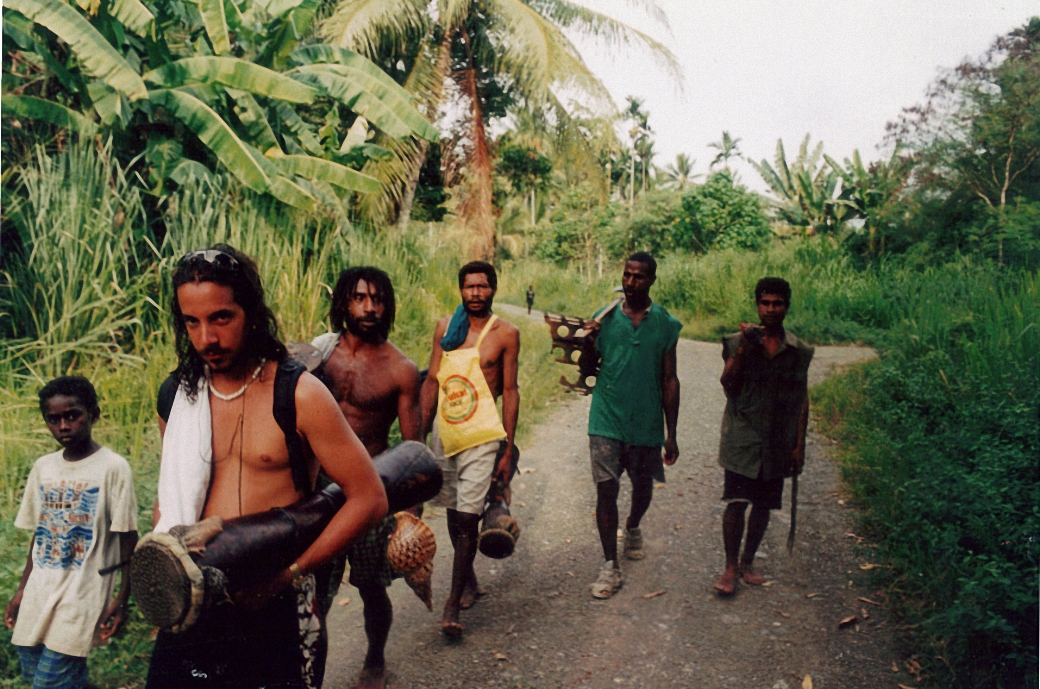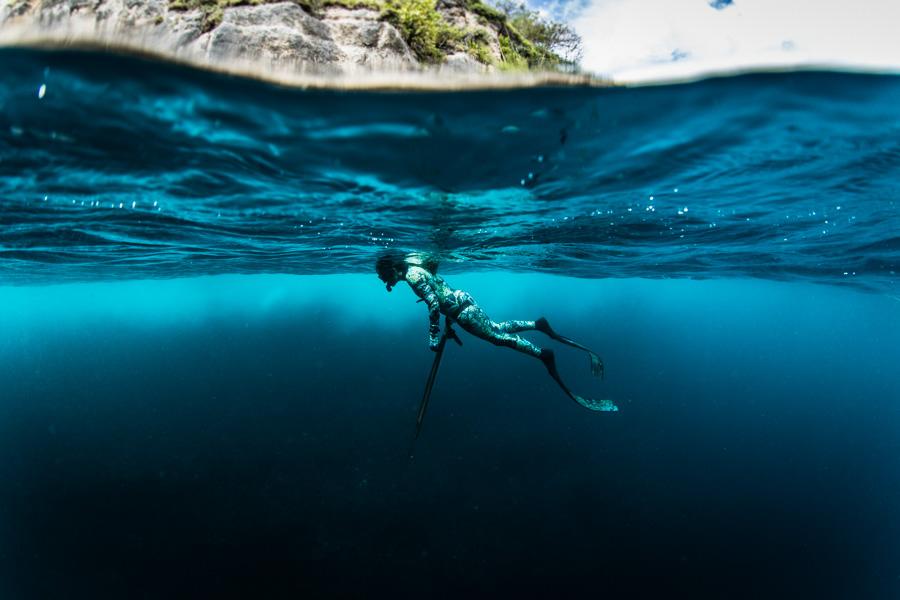SHANNON SOL CARROLL | Wavelengths
Life comes in waves.
Relationships, careers, weather patterns, even the very time on whose relentless currents we drift; the waves of life carry us and consume us. We can wait patiently for their blessing, be born upon their glassy faces, in complete control and ecstasy, or we can be buried beneath them, their shadow looming over us before plunging us into darkness.
As we all do, Shannon ‘Sol’ Carroll has spent his life buoyed upon the incessant undulations of life’s waves. Born in Byron Bay, Shannon’s father was a musician in an early ‘70s band, Moonstone, a resident act at the iconic Patch on Australia’s Gold Coast. The Patch was revered as the centre of certain social undercurrents, those with an appreciation as much of music as of a scene born of surf culture.
Migrating north, the family established themselves on Queensland’s Sunshine Coast, Shannon’s home, bar a few migrations, to this day. As he navigated life’s ebbs and flows, however, Shannon became acutely aware of these waves; those of the ocean that he would realise were an integral and unrelinquishable part of his life, those of friends, family and change, and those of a more sonic nature.
For Shannon, surfing and ocean waves are inseparably intertwined in his musical perspective, influencing his creativity, instigating his projects and continually reflecting one another, even when not directly connected.

When did you first have the desire to spend time in the ocean?
It’s tricky because my family was always at the beach. The first recollection I have of an experience riding a wave though was with my grandfather. He was an avid bodysurfer. One flipper was his thing; he’d always just wear one flipper and catch these waves all the way to the beach.
He was the one who first put me on a craft and got me onto a wave. He had this surf mat and I remember my hands on the front of the mat and his arms either side of me, and he’d be shouting ‘go Shannon! This is a good one – it’s not a dumper!’
That’s when I first experienced that rush, that thrill of riding waves. I must have been three years old, or just under, and I always remember his froth for it, his excitement for it – he just loved it.
Can you remember a time when you consciously made a decision not to be away from the ocean?
I never thought I’d be away from the ocean. As a kid, my friends and I would ride to the beach and surf for as long as we could before school started, and there was always the belief that I’d never be away from it and never stop doing it.
I got stuck into music and fortunately, a couple of my fellow band members were surfers as well. After a time, those bands broke up and I was at a bit of a loose end. It eventually all became just a bit too ‘small town’ and I started wanting the bright lights of the Big Smoke. I went to Brisbane with the remnants of the band we still had, and that was the start of the challenge to get back to the coast.
My parents still lived on the Sunshine Coast and it’s only an hour and a half drive, so I’d go back and forth. But slowly but surely I became more trapped. My new bandmates weren’t surfers and I was visiting the coast less and less…
I think a pivotal moment in that whole era was when my car broke down. Because I didn’t have my own wheels and no one else surfed, the ocean just dwindled away. The live music scene can be pretty intense. Half the time we were getting paid in beer, so it became a bit of a vicious cycle. Then one particular morning, it was late winter or early spring, I woke to one of those crystal-clear, blue-sky, westerly winds days. I was hungover – again – but I had an inkling there was some swell. I could smell it in the air; I just knew it was pumping somewhere and I looked out the window and thought to myself, ‘what am I doing? What happened?’ It was this momentous realisation that I had lost something that I loved so dearly.That was the moment I made the conscious decision to out of Dodge. It took a while though.
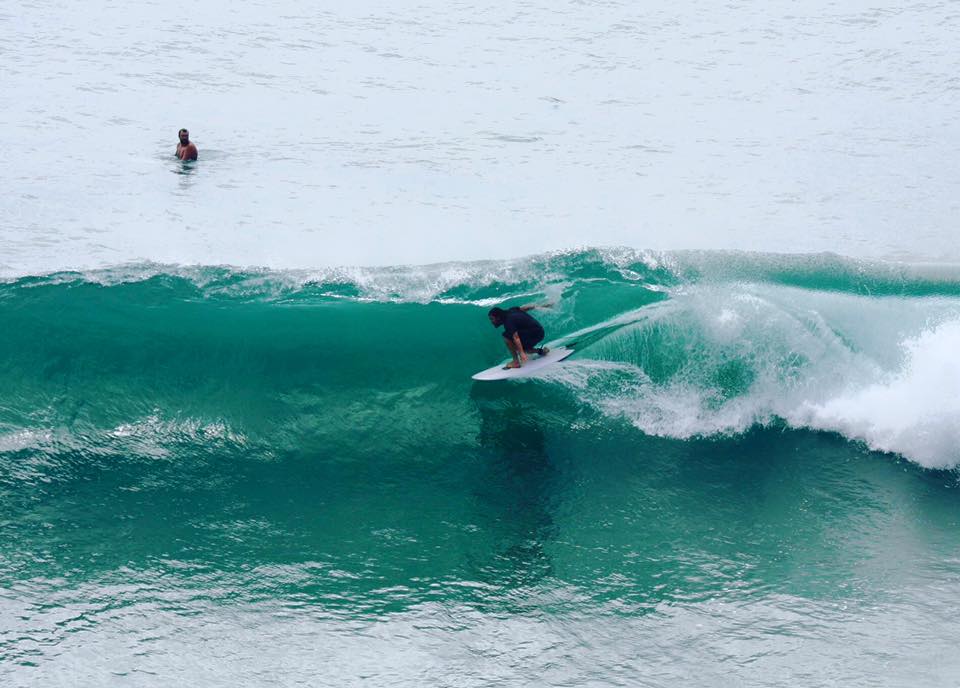
How did you make your way back to the ocean?
I was DJing at a club called The Regatta. This guy called Andrew Crockett would always come in in these crazy safari suits and vintage surf shirts. He was always asking for these obscure tunes and we eventually struck up a friendship.
I called in one time, it must have been early 2005, and he had all these amazing vintage surfboards everywhere. He was in the middle of writing his first book, Switchfoot, all about the history of Australian surfing. I didn’t really have a deep grounding in the history or culture of surfing, so it was pretty fascinating learning about that side of things.
I mentioned that I’d really like to move back to the beach and he said, ‘I’ve got a spare room downstairs – do you want to rent that?’ I was like, yes – sign me up! That heralded a new era. I got my surf froth back, bought this old singlefin, started surfing in a different way and on boards that I’d never had the opportunity to ride before, and learning a whole new side to surfing that I’d never known before.
Did you find that the move back was also a cathartic, healing experience?
I think those things become more obvious when you’re in the water. Having grown up in the ocean, I was finding myself in situations where my brain was saying, ‘you’ve got this. You’ve been out in bigger waves like this before and you’ll be fine.’ But because I was smoking cigarettes and drinking a lot, all of a sudden I realised that I wasn’t as fit as I used to be. It was being in those more challenging conditions that really brought it home. It became really obvious to me what I’d been doing to myself in the city. That became a battle that took a few years to resolve.
I remember when I first met Dave Rastovich and we began work on the Life Like Liquid project. At the time, I was so enamoured of Dave’s purity – he was meditating and doing yoga and so clean. We just felt like the Dark Side of the Force and he was this Jedi Knight! I found myself leading this double life, trying to conceal that side from him. We’d do gigs and it would all be a bit raucous, then I’d go surfing with Dave and try not to huff and puff too much on the way out.
Thomas Campbell invited me to Africa as part of his project, The Present. I remember getting there and was really trying not to smoke. I was there with my heroes, I knew the surf was going to be a decent size, but I was really struggling. It can be the hardest thing in the world at the time, but once you’re out you forget how hard it was.But that was the remnants of the life that I’d let myself slide into; I’d gone from being a pretty pure-living Sunshine Coast kid to my early 20s where I was living in the city, drinking and smoking and gigging all the time, then out the other side, back into the ocean and through this transition period back to a cleaner way of living.https://player.vimeo.com/video/29979178?api=1&autoplay=false&loop=false&muted=false&portrait=false&byline=false&title=false
With such an oceanic influence from an early age, the sea doubtlessly influenced your music on some levels, but was Life Like Liquid the first time those two aspects of your life cohesively gelled?
Life Like Liquid was the first time it had become a focus, for sure. It was the first time that I’d explored the links.
The reason I’d moved to Brisbane was that I was into a more exploratory, improvisational, contemporary jazz-inspired style. In the city, even though I wasn’t surfing, I was so buzzed on that style of music. That was what was important and I just wanted to keep following that thread.
When Andrew introduced me to Rasta, we began having conversations about what hooks you into surfing and the state of mind that you get into with improvised music, and realising that it is a state of flow that has no time. You become involved in a process that doesn’t give you time to contemplate. Your intuition takes over, and that no-mind state is just something you have to become comfortable with.
Every time you choose a line on a wave you get better at it, and then when you’re in a musical situation where it’s imperative that you maintain the flow you have to make these split-second decisions as well.
Finding the link between those two things became the seed for the Life Like Liquid project. Luckily Dave believed in it and had the means to make it happen. It was pretty much a dream to have one of these frequent wild ideas actually come to fruition.
From Life Like Liquid, you and your band, Band of Frequencies, worked on Thomas Campbell’s The Present and more recently, Phil Jarratt’s biopic of early Australian surf culture, Men of Wood & Foam. Where Life Like Liquid was almost purely experimental, both musically and visually, the latter could be considered far more conventional in a sense. How did you find the difference?
We definitely had a brief to work to for Men of Wood & Foam. Because there was already a storyline and it was anchored in specific eras of surfing culture that needed to be documented, it had definite needs to be fulfilled.
But despite there being Phil’s brief, we didn’t have the actual tunes pre-composed. We had vibes and ideas, and in similarity to Life Like Liquid, we just created the space for those things to happen. We still improvised most of the soundtrack, but we had a specific narrative to work to, specific references. So we got to emulate music of each era and yet still make it our own. It was hanging on by tenuous threads at times, but we connected to those original sounds.
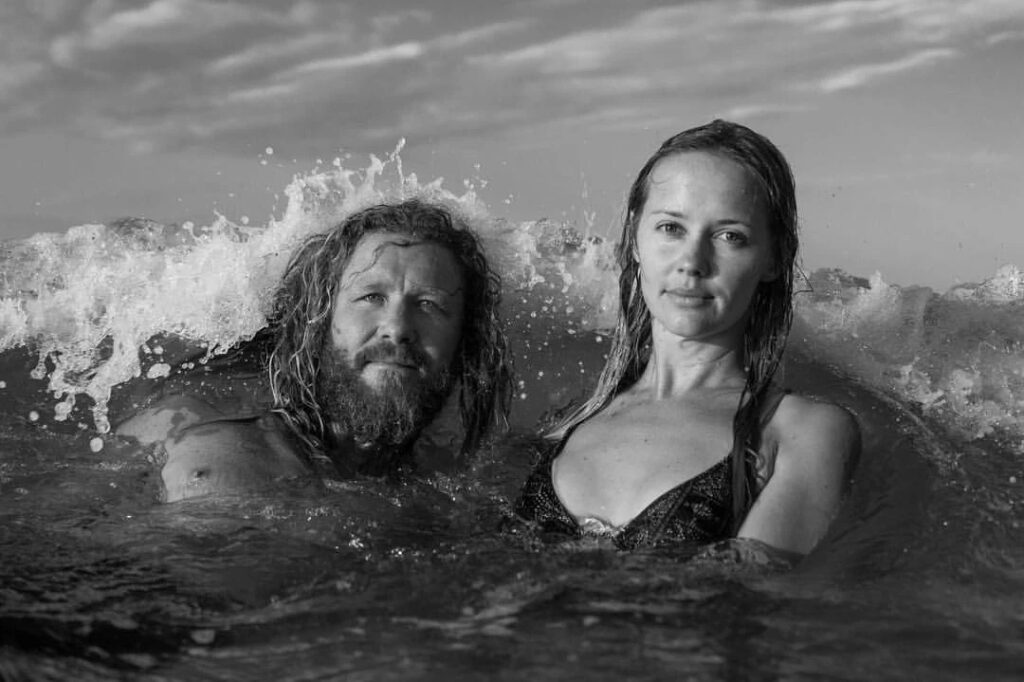
Was that notion of being pushed perhaps into genres that you weren’t so comfortable with almost more inspiring than the more improvised format of your own style?
It was definitely a healthy challenge. It’s such great music and it has its own style, there’s so much going on. It’s music I hadn’t necessarily immersed myself in. When you listen to music a lot you get the subtleties, so it’s refreshing to get thrown into the deep end with a style that you haven’t necessarily paid a lot of attention to in the past.
Do you ever find yourself subconsciously influenced by the ocean in your music, emulating the experience of surfing or the rise and fall of a wave?
We play music to film footage of surfing and the ocean. We had this amazing session on the North Shore after the Pipe Masters one year. We were actually playing, not so much to each individual wave, but as the set rolled in, the music intensity would build as the white noise of these huge sets would roll in. So we were playing off the dynamics of the ocean not only as a visual, but also because we could feel it and hear it and we were in its presence.
If you’re not in its presence or watching it on a screen, the main thing that sticks with you is a ‘flow literacy’ perhaps, that you develop through surfing or through playing music, especially improvising.
Rather than feeling a similarity with what it’s like to ride a wave, it’s more like a comfortability with flowing with whatever is happening. You’re not trying to emulate a moment that existed previously, you’re trying to make a new moment that feels just as good.

You’ve recently teamed up with Dave Rastovich again, along with his wife Lauren Hill, on the Waterpeople podcast – how did that come about?
They came to visit us and hang out for a few days. One evening Lauren asked how I’d feel about being editor and sound engineer for a podcast. I hadn’t really thought about it before. After a bit of thought I said, ‘for sure – I’d love to do that.’
I’ve done a lot of projects with them in the past, with the Transparentsea Voyage, Life Like Liquid, activism in Japan and other trips we’ve done. So it felt like an avenue I hadn’t contemplated, but also it was with them, so it was just a really good match. I was in a time and place where I wanted to do something different and it was a really interesting way of pulling together different elements we’d already been working on.
It brings together interesting people, interesting conversations, activism as well as showcasing diverse and unique multi-generational stories – stories that haven’t been heard so much within the surfing organism. It just struck me as a really great idea, so we launched into it.https://www.youtube.com/embed/OdwBKlpuWBA?start=0&autoplay=0&loop=0&mute=0&controls=0&enablejsapi=1
Shannon during the TransparentSea Voyage, with Howie Cooke. Photo: Hilton Dawe
Is there a core message, or are you simply speaking with interesting individuals of the surfing community?
There’s a whole world full of waterpeople, but in terms of being invited to speak on the podcast, there’s a balance. There’s a balance of gender, a balance of diversity, with voices that haven’t necessarily been heard a lot, and an inter-generational balance. I suppose we always try to have equal numbers of men and women. Then we like to hear from different cultural backgrounds, people of colour and people who aren’t usually in the surf media in general. We like to be as universally inclusive as possible.
If there’s any ethos behind it, I suppose it’s a gathering of a global ocean community that we envision being more representative of the reality of the situation than the surfing media has been depicting.
Do you think there’s also a sense of giving a voice to people you see as conveying an important message?
Definitely. That’s always been an underlying factor in all the projects I’ve done with Dave and Lauren, like with the TransparentSea Voyage down the California coast. We’re utilising the platform to shine a light on people who are doing great work, or who have had interesting lives. There’s always some little insight that we can all glean from it. Lauren and Dave actually invite all the guests – I just get the pleasure every week of opening up a conversation that I just happen to be sitting at the table for! And therefore, everyone who listens to the podcast also gets the opportunity to sit at the table and listen to them having that same conversation.I love it because there’s such a mutual respect. Most of the people featured on the podcast know of Dave and Lauren and they get to hang out – it’s not just an interview, it’s a conversation. So sometimes it’s the guest that will be asking the questions, so we get this insightful banter, this wonderfully rich back-and-forth.
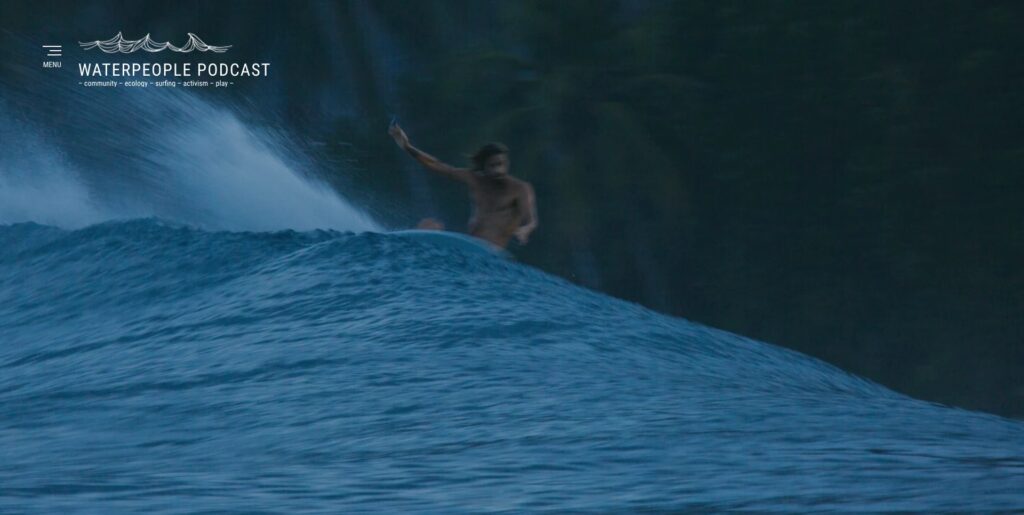
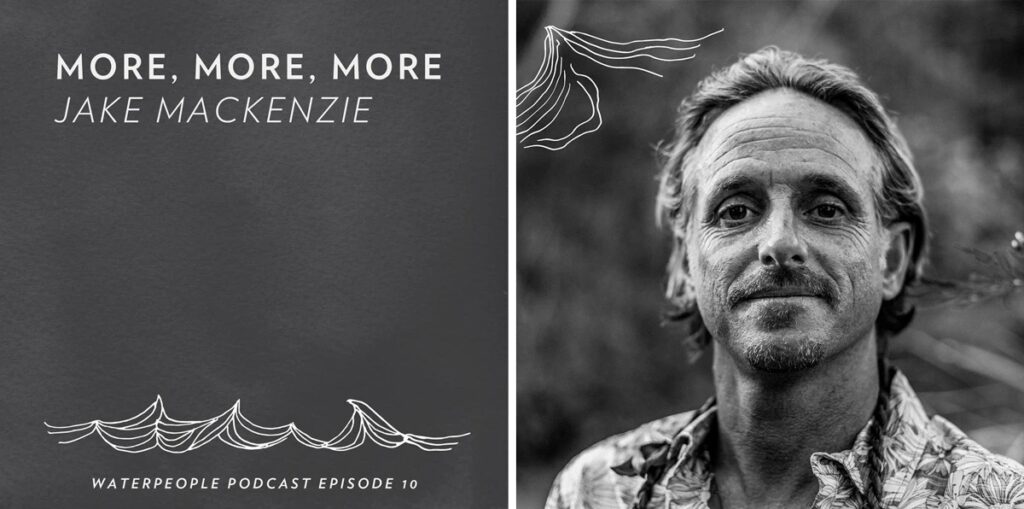
Listen to the Waterpeople Podcast with Dave Rastovich & Lauren Hill
Do you think your musical career would maintain its same form or balance if you were to now move away from the ocean?
At this stage, I don’t think it would change that much. Left to my own devices, I guess it would continue on in a similar trajectory. I get a lot of my inspiration from the natural world. So if I wasn’t near the ocean I’d just immerse myself in lots of other natural environments.
I love hearing the non-human world and the sounds it makes, so if I wasn’t near the ocean I think I’d just keep pursuing the sounds of nature.
Your musical style has a beautiful ebb and flow to it anyway, a permanent state of flux and evolution, but is there an avenue of your music you’d like to pursue further?
More ambient music I think. More music that is beneficial for my mental health and that of others. Just beautiful tones inspired by and combined with bird calls and the sounds of nature – that I would love to explore in the future.It feels like the human voice is so loud, but I think a lot of us could benefit from listening to what’s around us, rather than listening to each other or ourselves. This country is where songbirds originally came from, they’ve been around for tens of millions of years, so I think we need to take time to stop and listen – and to document these incredible sounds.
Band of Frequencies is a different kettle of fish. We’ll probably head in all sorts of different directions. We have such an interesting ensemble that I wouldn’t really like to speculate where we might head.
We’ve often created music for a purpose, whether it’s a movie soundtrack or for a specific gig. We’ll basically make the music the best we can do with the time and the space we’ve been given, rather than just do the same thing we’ve always done regardless of where or when we’re doing it.
A lot of artists simply present their music as their audience knows it, as they first recorded it, but we’ve never been like that – we’ve always adapted to the moment. Saying that, I feel like Band of Frequencies could go anywhere. We enjoy playing to historical surf footage, such as in Men of Wood & Foam, it’s really exciting to explore different avenues, so who knows where we’ll end up?
• • •
Wherever the waves may drift, Shannon has found an appreciation for them that geography, circumstance and time cannot shake. It is an awareness he carries with him, whether consciously or not; one that is reflected in the beat of his heart and the rhythms of his life.
The unity of ocean and music is a symbiosis integral to his life choices and his career path, holding endless potential, wave after wave and swell after swell.

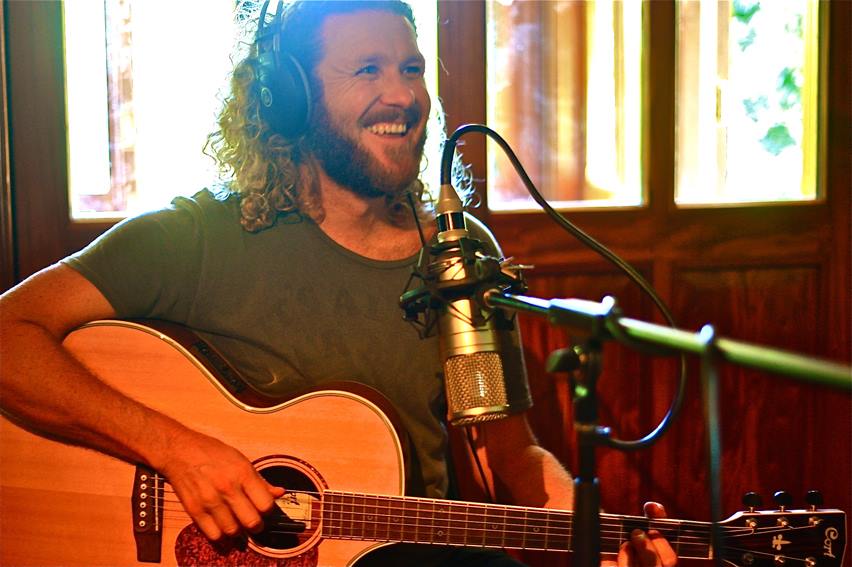


Dave Rastovich’s film project, Minds in the Water, for which Shannon & the Band of Frequencies created the title track.
Article first published on Drifter Surf, Oct, 2021
You May Also Like
